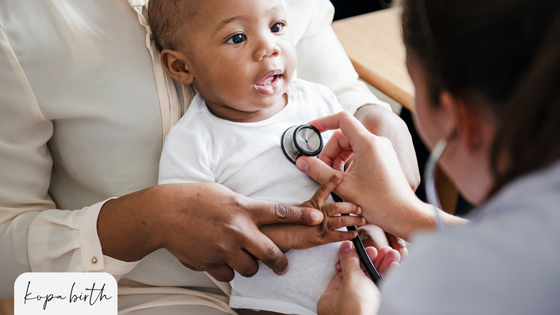
It is important for all babies and children to be seen regularly by their healthcare provider, even when they’re not sick. Consistent healthcare is an important part of good health. Well child visits help ensure that your baby is growing and developing properly and that any problems are found early and can be treated effectively. But you may be wondering How often should I take my baby to the doctor? Let’s look at the recommended schedule for well visits, and also things you may discuss at doctor visits.
Estimated reading time: 5 minutes
First off, regular check-ups, often called well-baby visits, are crucial. These appointments are not just for when your baby is ill; they are important opportunities to track your baby’s growth and development, get vaccinations, and address any concerns you might have.
So, aside from sick visits, how often do you do well child checks? The American Academy of Pediatrics (AAP) recommends the following schedule for well-baby visits:
After 3 years old, your child will only need a well child checkup once a year. However, your child may need more visits if they have health problems or are experiencing any developmental delays. If you are worried about your baby and think they may need to be seen, don’t wait until the next visit. Call your doctor to discuss the concern.
At your baby’s well visits, his or her doctor will discuss any potential health concerns and also give you guidance on how to care for baby, what to expect in coming months, etc. You will also have time to bring up any questions or concerns that you have to get professional input and advice.
If you have any questions or concerns, don’t hesitate to ask. This is the time to establish trust and communication with your child’s doctor. If you have noticed any changes in your baby’s behavior or routine, mention it. You can even write down a list of topics you want to discuss beforehand so you don’t forget something important. If you do forget, you can always call the office afterward to ask. Don’t ever feel embarrassed or ashamed to ask for more information, clarification, or help when you need it. Remember that your baby’s doctor and well child visits are critical resources to help keep your baby healthy and well cared for.
Apart from these regular check-ups, you should take your baby to the doctor if they:
You know your baby better than anyone else. If something doesn’t feel right, it’s always better to err on the side of caution and consult your pediatrician.
Regular pediatric appointments are a fundamental part of your baby’s first year. They ensure that your baby is growing and developing as they should and give you peace of mind. So, keep up with this schedule, and know that with each visit, you’re doing something wonderful for your baby’s health and well-being.
Kopa Birth’s online childbirth classes allow you to prepare for a natural childbirth from the comfort of your own home, 24/7. Enroll today in our free online childbirth class to learn more about preparing for a natural hospital birth.
References:
It is important for all babies and children to be seen regularly by their healthcare provider, even when they’re not sick. Consistent healthcare is an important part of good health.